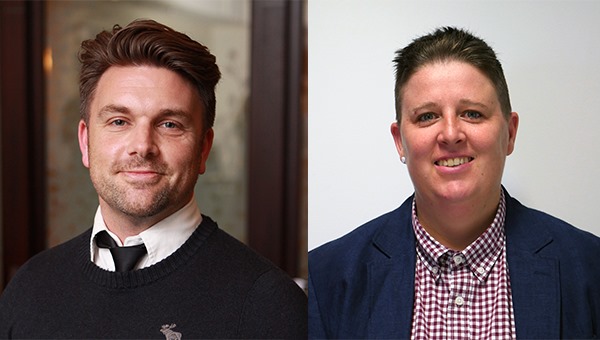Matt Deaner and Holly Brimble.
Screen Producers Australia (SPA) has warned that Free TV Australia’s proposed voluntary points system for Australian content would have disastrous consequences for the screen sector.
In a wide-ranging critique of the submissions to the Federal Government’s ‘Supporting Australian Stories on Our Screens’ options paper, SPA disputes Free TV’s claims about escalating content costs, pointing out the commercial broadcasters’ spending on local drama and documentaries in 2018-19 was far lower than it was in 2016-17.
The points system would be “pretty devastating to content, jobs and investment,” SPA’s director of policy Holly Brimble said in a Tuesday webinar with SPA CEO Matt Deaner.
SPA also takes issue with Foxtel’s proposal to scrap the requirement to invest at least 10 per cent of its total program expenditure on new Australian drama, arguing that would provide more flexibility to invest across a variety of genres.
Deaner queried the logic of that idea given the brand value that Foxtel derives from its signature Australian dramas such as Wentworth.
Understandably SPA rejects the SVOD platforms’ call for a voluntary model, with the government setting out a broad set of guiding principles for the streaming industry’s unspecified “meaningful contribution” to local content.
“A voluntary system has no backstop or guarantee if something changes and the platforms want to move away from that,” Brimble said. “We just can’t keep kicking the can down the road.
“We say the content providers could go to the regulator with proposals on how they could invest a percentage of their revenues on commissioning new Australian content, which builds in the flexibility they are looking for.”
The SPA execs were critical of the ABC’s contention that forcing it to comply with a local content quota or spending obligations would undermine its independence.
Deaner said tied funding for drama, documentary and children’s content would “ensure there is protection of resources internally at the ABC.”
Brimble also expressed concern that the ABC’s pledge to invest a total of $70 million on scripted drama, including comedy and Indigenous, and $36 million children’s programming in each of the next two financial years means there is no certainty over its local content commitment beyond that due to the government-imposed indexation freeze.
Commercial FTA broadcasters’ local content spend (Source: ACMA).
The Australian Directors’ Guild advocates that at least 5-7 per cent of all service providers’ revenues should be invested in new Australian scripted content, proportionate to their business model.
If a provider does not meet its annual revenue quota, the remaining revenue would go to a new Creative Fund for development, production and industry innovation, the ADG said.
Deaner is not keen on the concept of a fund, believing it would lead to more government decision-making about how content is produced and a disconnect between producers and the commercial marketplace.
Free TV Australia cited rising content costs in support of its case for deregulation. However SPA pointed out the commercial networks collectively invested $95.7 million on Australian adult drama out of total spend of $1.8 billion in 2018-19, down from $126.2 million in 2016-17.
There was a surge in investment in light entertainment in that period while there were small drops in spending on sport and news and current affairs.
Their outlays on local drama, children’s and documentary content represented just 7 per cent of total program expenditure in 2018-19.
Deaner contrasted Free TV’s plea for deregulation with its desire for greater access to funding through a doubling of the TV Producer Offset and for networks’ in-house productions to qualify for Screen Australia funding.
Referring to the temporary suspension of the broadcasters’ local content quotas, he said: “No commissioning happens when you don’t have regulation.”
Source: Think TV and ACMA.




